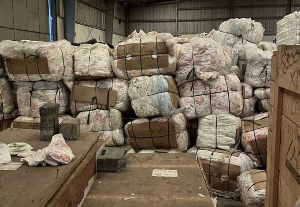Authorities are raising red flags over the widespread sale of contaminated and unapproved baby diapers across Ghana, as disturbing revelations emerge about how banned foreign products—originally marked for destruction—are being repackaged and sold to unsuspecting consumers.
The Consumer Arbitration and Mediation Centre (CAMC), in collaboration with the Consumer Protection Agency (CPA), has confirmed the circulation of unsanitary baby diapers in multiple markets across the country, including Accra, Kasoa, Tamale, Kumasi, and Sefwi Wiawso.
FDA Seizes Over One Million Diapers
The development follows a major enforcement operation by the Food and Drugs Authority (FDA), which recently seized and destroyed over one million pieces of contaminated diapers.
According to CAMC Executive Director, Nana Prempeh Okogyeabour Aduhene, the diapers—mostly imported from China—were rejected abroad due to safety failures.
“These diapers were originally designated for disposal,” Mr. Aduhene said in an interview on Citi FM. “But unscrupulous importers retrieved them from landfills, repackaged them under unhygienic conditions, and sold them in local markets wrapped in plain polythene bags.”
Illegally Repackaged and Sold to Ghanaians
Laboratory tests conducted by CAMC on samples collected from several regions reportedly revealed high levels of microbial contamination, prompting immediate regulatory alerts.
The diapers, lacking proper labels, batch numbers, or identifiable country-of-origin markings, pose serious health risks to infants and have been linked to widespread reports of skin infections and rashes among babies.
Read Also: U.S. halts new student visa appointments for expanded social media screening
Health Risks and Rising Consumer Complaints
Mr. Aduhene stated that CAMC launched an independent investigation in mid-2024 after receiving multiple consumer complaints.
“We shared our findings with the FDA, which then carried out inspections and shut down several illegal repackaging operations,” he added.
The CPA’s own investigations support these findings, indicating that many of the diapers were smuggled into Ghana through informal channels after being banned in their country of origin. CPA Director of Mediation and Arbitration, also named Mr. Nana Aduhene, called the situation “alarming and unacceptable.”
“Are Ghanaian children not entitled to safe and hygienic baby products?” he questioned. “It is unconscionable that any business would sacrifice the health of infants for profit.”
Low Cost Fuels Demand Among Struggling Families
The diapers’ low price point—sometimes three times cheaper than approved brands—**has further contributed to their popularity among low-income households, making regulatory enforcement even more critical.
Related Case: Child Dies from Counterfeit Paint Exposure
In a separate but related incident, CAMC also revealed that counterfeit paint products falsely labeled as “American paint” are being sold across the country.
One such case reportedly resulted in the death of an asthmatic child in Kumasi who was exposed to high lead concentrations in freshly painted indoor walls.
Calls for Tighter Port Controls and Market Surveillance
Both CAMC and CPA are calling for tighter controls at Ghana’s entry points and more rigorous market surveillance to combat the import and distribution of hazardous consumer products.
The FDA has pledged to broaden its enforcement efforts beyond the Greater Accra region, with nationwide community awareness campaigns also planned.
Public Urged to Avoid Unlabelled Products
Meanwhile, parents and guardians are being strongly urged to avoid purchasing unlabelled or unfamiliar diaper brands and to immediately report any suspected adverse effects to health authorities.
“This is a matter of public safety,” said Mr. Aduhene. “We cannot afford to be complacent when it comes to the health and welfare of our children.”

























